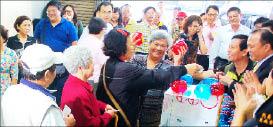The chances of President Ma Ying-jeou (馬英九) and Democratic Progressive Party Chairwoman Tsai Ing-wen (蔡英文) winning January’s presidential election are about even, according to an election prediction exchange.
National Chengchi University’s Prediction Markets Center said yesterday that Ma’s chances of winning the election rose steadily from early September and reached a peak on Oct. 16 when he was 18.7 percentage points more likely than Tsai to emerge victorious.
However, that lead has narrowed after Ma a day later floated the idea of the possibility of a peace pact being signed with China within the next 10 years.

Photo: Yang I-min, Taipei Times
As of Monday, Tsai was given a 48.9 percent chance of victory, while Ma’s chance stood at 48.4 percent. Tsai had a narrow lead on the exchange in six of the seven days through Monday.
On a separate exchange predicting what percentage of the vote Ma and Tsai would get, Ma had maintained a narrow lead over Tsai since June 19, but this was also reversed after Ma broached his peace pact idea.
Tsai’s “stock” pushed ahead of Ma’s on Oct. 19 and estimates of their respective vote count remained within 0.6 of a percentage point of each other until Monday, when Tsai moved 0.8 of a percentage point ahead, indicating that the DPP chairwoman has shed any disadvantage she was perceived as having in the race.
People First Party Chairman James Soong (宋楚瑜) saw prediction markets participants push his chances of victory slightly higher on Monday, giving him a 4.4 percent chance of winning as opposed to 3 percent on Oct. 25.
On another market, 92.7 percent of participants predicted Soong would be able to garner more than 257,000 signatures from eligible voters — the minimum needed for him to make a presidential run.
Soong and his running mate, Taiwan University professor emeritus Lin Ruey-shiung (林瑞雄), yesterday announced that they had collected more than 350,000 signatures endorsing their ticket and confirmed that they would move to join the presidential race.
The center’s markets have predicted since the end of September that there was an 80 percent likelihood of Soong joining the presidential race, a probability that rose to 90 percent on Monday.
The center said that its markets have successfully forecast the results of five recent major elections, including the December 2006 mayoral elections in Taipei and Kaohsiung and the January 2008 legislative elections.
In the 2008 legislative elections, the markets accurately predicted 80 percent of the winners in the 73 constituencies 13 days prior to election day, the center said.
According to the center, prediction markets efficiently collect effective information through a futures or stocks trading mechanism that relies on the wisdom of the public, who buy and sell contracts of future events on the markets.

Alain Robert, known as the "French Spider-Man," praised Alex Honnold as exceptionally well-prepared after the US climber completed a free solo ascent of Taipei 101 yesterday. Robert said Honnold's ascent of the 508m-tall skyscraper in just more than one-and-a-half hours without using safety ropes or equipment was a remarkable achievement. "This is my life," he said in an interview conducted in French, adding that he liked the feeling of being "on the edge of danger." The 63-year-old Frenchman climbed Taipei 101 using ropes in December 2004, taking about four hours to reach the top. On a one-to-10 scale of difficulty, Robert said Taipei 101

A preclearance service to facilitate entry for people traveling to select airports in Japan would be available from Thursday next week to Feb. 25 at Taiwan Taoyuan International Airport, Taoyuan International Airport Corp (TIAC) said on Tuesday. The service was first made available to Taiwanese travelers throughout the winter vacation of 2024 and during the Lunar New Year holiday. In addition to flights to the Japanese cities of Hakodate, Asahikawa, Akita, Sendai, Niigata, Okayama, Takamatsu, Kumamoto and Kagoshima, the service would be available to travelers to Kobe and Oita. The service can be accessed by passengers of 15 flight routes operated by

Taiwanese and US defense groups are collaborating to introduce deployable, semi-autonomous manufacturing systems for drones and components in a boost to the nation’s supply chain resilience. Taiwan’s G-Tech Optroelectronics Corp subsidiary GTOC and the US’ Aerkomm Inc on Friday announced an agreement with fellow US-based Firestorm Lab to adopt the latter’s xCell, a technology featuring 3D printers fitted in 6.1m container units. The systems enable aerial platforms and parts to be produced in high volumes from dispersed nodes capable of rapid redeployment, to minimize the risk of enemy strikes and to meet field requirements, they said. Firestorm chief technology officer Ian Muceus said

MORE FALL: An investigation into one of Xi’s key cronies, part of a broader ‘anti-corruption’ drive, indicates that he might have a deep distrust in the military, an expert said China’s latest military purge underscores systemic risks in its shift from collective leadership to sole rule under Chinese President Xi Jinping (習近平), and could disrupt its chain of command and military capabilities, a national security official said yesterday. If decisionmaking within the Chinese Communist Party has become “irrational” under one-man rule, the Taiwan Strait and the regional situation must be approached with extreme caution, given unforeseen risks, they added. The anonymous official made the remarks as China’s Central Military Commission Vice Chairman Zhang Youxia (張又俠) and Joint Staff Department Chief of Staff Liu Zhenli (劉振立) were reportedly being investigated for suspected “serious